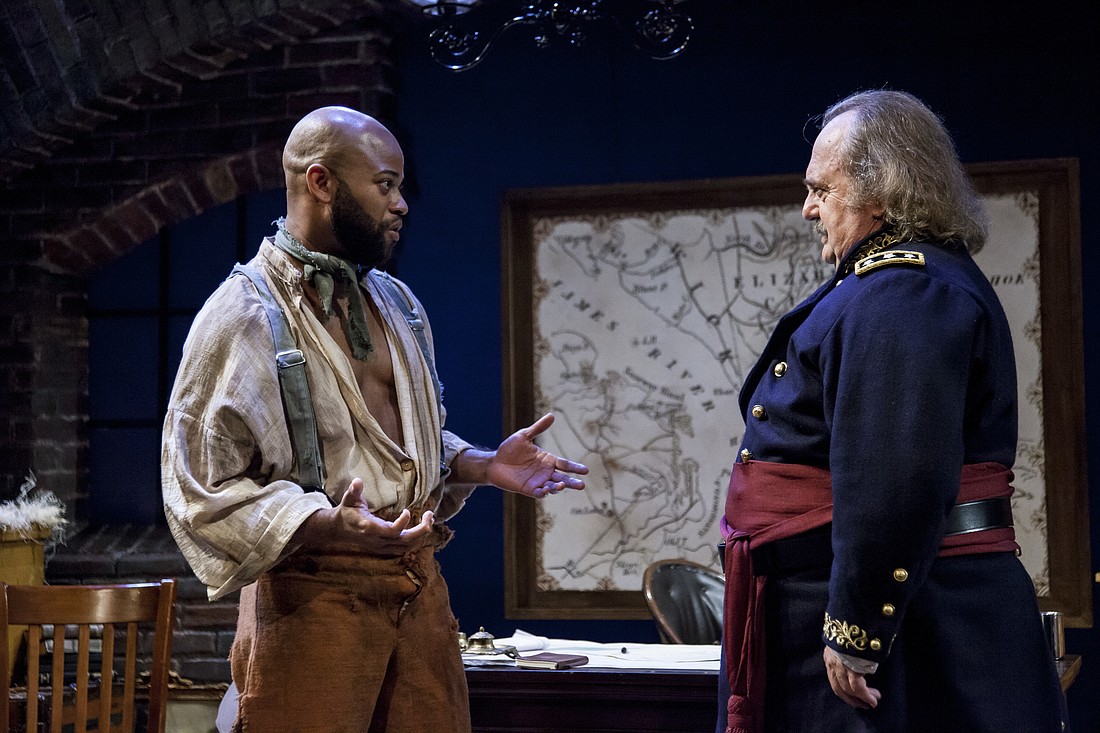- July 4, 2025
-
-
Loading

Loading

There are scores of plays about America’s uneasy racial history, some heartfelt, some exploitive, some with an obvious eye for grant money. Richard Strand’s “Butler,” the latest offering at Florida Studio Theatre, is strikingly original, defiantly smart, and very, very funny.
The play revolves around a largely forgotten incident of the Civil War. The “Butler” in question isn’t a manservant but a major general on the Union side named Benjamin Butler (Eric Hoffmann). This cantankerous, brilliant lawyer despised abolition but took this commission because he despised secession even more. As the play opens, Butler is the newly arrived commander of Fort Monroe in northern Virginia. (This was a federal military installation on a peninsula in Chesapeake Bay with access by sea but cut off by Confederate forces on the land.) Holding the fort is no easy task—and Butler’s job gets even harder when three fugitive slaves show up.
Their leader, Shepard Mallory (Shane Taylor), demands sanctuary for himself and the others. Butler hates the word “demand.” But, in spite of himself, he’s drawn into debate with Mallory, who’s convinced that Butler can pull a “lawyer’s trick” to defy the Fugitive Slave Act and not send the slaves back. Moral philosophy fails to persuade Butler; practical argument does. Mallory points out that it’s Butler’s choice whether the slaves build fortifications for the South or the North. That gives the general an idea: Legally, the three slaves are military contraband which he can commandeer for the Union war effort. Mallory praises his chicanery—and says the odds of keeping this maneuver a secret are slim. He turned out to be right after Butler actually performed his lawyer’s trick. The resulting tide of fugitive slaves seeking sanctuary ultimately led to the Emancipation Proclamation.
Profound ideas led to that profound result; ideas are the play’s focus. Strand’s writing has much common with “The Paper Chase”—and Butler could easily have been Professor Kingsfield’s ancestor. Director Jason Cannon creates a believable (and often hilarious) Socratic dialog between the general and the fugitive slave. It’s more than an intellectual exercise. Cannon never lets us forget what’s at stake.
Ideas also define character. (“As a man thinks in his heart, so is he,” as the Good Book says.) Hoffmann’s fine performance reveals Butler’s brilliant, bullying mind at work as he slices and dices his adjutant’s (Joe Ditmyer) casual choice of words at the start of the play. When Mallory finally enters the arena, we know what he’s in for. Taylor deftly evokes the contradictions of his character—an improbable mix of arrogance and obsequiousness.
The fugitive slave gives as good as he gets in the debate with the general—until fear makes him back down. In a parallel universe, Mallory would’ve been a general and Butler a slave. But Mallory knows what universe he’s living in, and has the scars on his back to prove it. Ditmyer’s adjutant character has contradictions of his own. Lieutenant Kelly walks on cracked eggs to keep the general happy, but is tough as nails on the inside. Kelly initially despises Mallory, but he knows a tough soul when he sees one and changes his mind. That’s something the blowhard Confederate officer (Jim Sorensen) is incapable of—as Butler discovers when that officer shows up to take Mallory home to a sure lynching. The officer’s arrogance changes Butler’s mind—and prompts him to perform the legal legerdemain he’s only been contemplating.
This war of wits unfolds in the crate-cluttered chaos of Butler’s office (kudos to Moriah and Isabel Curley-Clay’s no-nonsense set design). Donna Riggs costumes fit the times without making the times seem too conveniently remote.
But the Civil War might as well have happened yesterday. The battles continue, if in subtler form. “Butler” finds high comedy in those battles. But it never lets you forget the ideas behind the fighting.